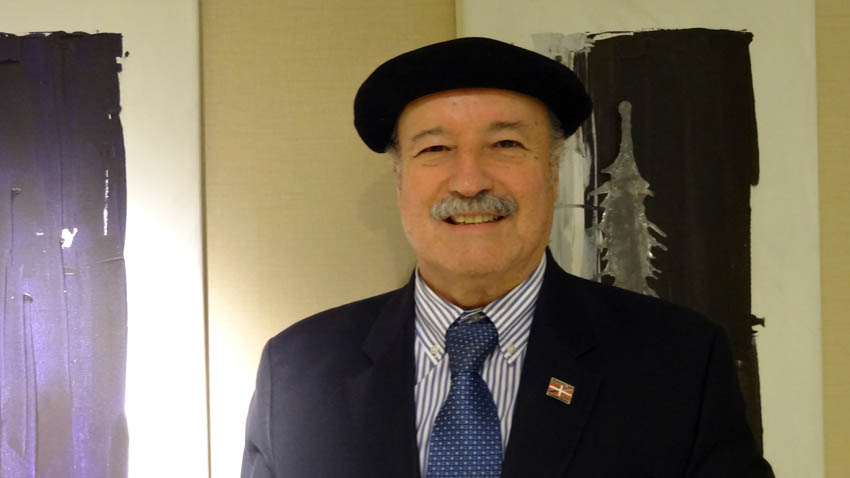Joseba Etxarri/Asuncion, Paraguay. He comes to the meeting at an establishment in Asuncion with the typical txapela or Basque beret, that carries the mark Elosegui from Tolosa, we checked.
-Anyone who sees you with this txapela and this demeanor, is not going to have a doubt that you are Basque.
I am of Basque origin. I was born in Buenos Aires, but have been living in Paraguay for 42 years and I have made my life here. Our family is a mix of blood from various places, German, Italian…but I have always admired the Basques and I identify with this branch, I feel Basque.
-What does it mean to you?
When I think about being Basque I think about my grandfather and his brothers who I met, and the things that we learned as children from our parents, my grandparents, my uncles, the value of your word, the value of honesty and work, to keep your family name clean and spotless.
-What do you know about your ancestors that came here?
Very little. I didn’t know them and I met two of my grandfather’s brothers. My great-grandfather was Pedro, like my grandfather. On the marriage license in Buenos Aires with my great-grandmother Iribarne it says, “Pedro Elicetche, from France.” My aunt grandmother Estefania that was the closest link that we had with the family history died at the age of 98 and she told us that there were seven of them that came to America between siblings and cousins, some of them also from the Sabarots branch. Her mother told her that after they reach port in Buenos Aires, some of them went south to Bahia Blanca, and others to Entre Rios and some to Paraguay. But we lost touch, and I am talking from 1870 or 80.
-How do people think of the Basque Country from Paraguay?
It’s different how I see it and how a normal Paraguayan would see it. A normal Paraguayan probably wouldn’t distinguish the Basque Country from Spain. Those of us that know it, see it, besides sentimentally, with a lot of economic potential and work. If we examine Spain, this is economically its more relevant area, the Basque Country has experienced some critical moments, it was affected by terrorism, but that came out and maintained its economic power, despite the current economical crisis. We recognize that strength.
-Is there anything Basque in Paraguay?
I would say very little. The Franciscans from here depended on the Basque Franciscan province until recently, and a large part of the monks and priests that came were Basque; in fact, when we established the Basque club in Asuncion in the 90s, we had our statutes translated into Basque by them, and thanks to them we celebrate Saint Ignatius with mass every year, concelebrated by three priests partially in Basque. There is also the San Jose College in Asuncion, founded in 1904 by the Bayonne Priests, betharramites, that also has a tradition of Basque priests; a bishop that is still alive, whose last name is Gogorza was a man at that school. There is also a group of French Basques that founded Villa Hayes, on the other side of the Paraguay River, in the 19th century. There are some groups of Basques in the interior, for example in San Juan Bautista that maintain certain traditions, including the descendants of the Sasiain family.
-Because of the crisis Basque youth are now forced to look abroad to try their luck.
We have had some, but not many. Even I am sure that Paraguay is now experiencing an interesting economic time. We suffer from the lack of professionals and skilled labor. Everything is yet to be done here. We have a healthy and stable economy. We are the least indebted country in the Americas, our foreign debt reached 18% against 100% that the United States has surpassed for example. Our currency is the most stable in the area….But the flipside is that there is much to be done. We need capable professionals that can help us get this country going.
-You were one of the founders of the Asuncion Basque club less than 20 years ago.
Yes, and from the Basque club we thought it would be a good thing to bring Basque youth, capable technicians. Paraguay would welcome young Basque professionals to help get this country going. And as a Basque club we would like to serve as link to the Basque Country, not only culturally, but also economically. We have good contacts in the public and private sectors in the Paraguayan economy. Our club's president, Txema Bruno Lacarra, is interested in working in this field to acquire Basque investments in Paraguay. It’s a matter of examining niches that can work, things that can be done of mutual interest. And this is a good time.






 Send to a friend
Send to a friend Add comment
Add comment








